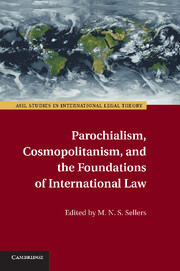Book contents
- Frontmatter
- Contents
- Notes on Contributors
- Preface
- 1 Introduction
- 2 Parochialism and the Legitimacy of International Law
- 3 Parochialism, Cosmopolitanism, and the Paradigms of International Law
- 4 Liberal Cosmopolitanism or Cosmopolitan Liberalism?
- 5 Are Human Rights Parochial?
- 6 The Parochial Foundations of Cosmopolitan Rights
- 7 Rights in Reverse
- 8 Parochial Restraints on Religious Liberty
- 9 Parochialism, Cosmopolitanism, and Justice
- Index
- References
5 - Are Human Rights Parochial?
Published online by Cambridge University Press: 05 December 2011
- Frontmatter
- Contents
- Notes on Contributors
- Preface
- 1 Introduction
- 2 Parochialism and the Legitimacy of International Law
- 3 Parochialism, Cosmopolitanism, and the Paradigms of International Law
- 4 Liberal Cosmopolitanism or Cosmopolitan Liberalism?
- 5 Are Human Rights Parochial?
- 6 The Parochial Foundations of Cosmopolitan Rights
- 7 Rights in Reverse
- 8 Parochial Restraints on Religious Liberty
- 9 Parochialism, Cosmopolitanism, and Justice
- Index
- References
Summary
A Quick Sketch of the Personhood Account of Human Rights
We agree that human rights are rights that we have simply by virtue of being human. That does not get us far, however, because we lack agreement on the relevant sense of “human.” Thus, our notion of a “human right” suffers from no small indeterminateness of sense. During the seventeenth and eighteenth centuries, when thinkers increasingly accepted that human rights were available to reason alone apart from belief in God, the theological content of the notion was gradually abandoned, and nothing was put in its place. The term was left with so few criteria for determining when it is used correctly and when incorrectly that today we often have only a tenuous, and sometimes a plainly inadequate, grasp on what is at issue. One of our pressing jobs now is to remedy the indeterminateness.
A term with our modern sense of “a right” emerged in the late Middle Ages, probably first in Bologna, in the work of the canonists, who glossed, commented on, and to some extent brought system to the many, not always consistent, norms of canon and Roman Law. In the course of the twelfth and thirteenth centuries the use of the Latin word ius expanded from meaning a law stating what is fair to include also our modern sense of “a right”: that is, an entitlement that a person possesses to control or claim something. For instance, in this period one finds the transition from the assertion that it is a natural law (ius) that all things are held in common and thus a person in mortal need who takes from a person in surplus does not steal, to the new form of expression, that a person in need has a right (ius) to take from a person in surplus and so does not steal. The prevailing view of the canonists was that this new sort of ius, a right that an individual has, derives from the natural law that all human beings are, in a very particular sense, equal: namely, that we are all made in God's image, that we are free to act for reasons, especially for reasons of good and evil. We are rational agents; we are, more particularly, normative agents.
- Type
- Chapter
- Information
- Publisher: Cambridge University PressPrint publication year: 2011



